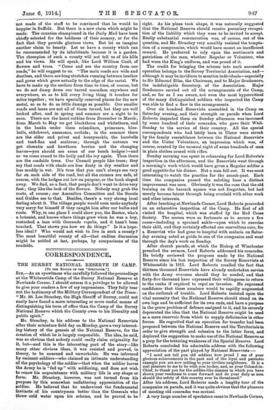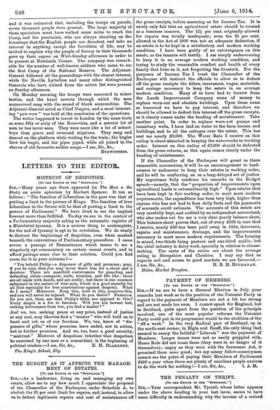CORRESPONDENCE.
THE SURREY NATIONAL RESERVE IN CAMP.
[To Tax EDITOR Or TRY "SPRCTATOR....1 Sin,—As an eyewitness who carefully followed the proceedings at the Whitsuntide Camp of the Surrey National Reserve at Newton& Corner•, I should esteem it a privilege to be allowed to give your readers a few of my impressions. They fully bear Out the testimony of the Military Correspondent of the Times: "Mr. St. Lee Strachey, the High Sheriff of Surrey, could not easily have found a more interesting or more useful means of distinguishing his term of office than the Camp of the Surrey National. Reserve which the County owes to his liberality and public spirit."
Mr•. Strachey, in his address to the National Reservists after their miniature field day on Monday, gave a very interest- ing history of the genesis of the National Reserve, for the creation of which he is largely responsible. The idea, be said, was so obvious that nobody could really claim originality for it, but—and this is the interesting part of the story—like many other obvious ideas, it was resisted and proved, in theory, to be unsound and unworkable. He was informed by eminent soldiers—who claimed an intimate understanding of the psychology of the soldier—that when the soldier leaves the Army he is "fed up" with soldiering, and does not wish to renew his acquaintance with military life in any shape or form. Mr. Strachey, however, was not turned from his purpose by this somewhat unflattering appreciation of the Boldier. He believed that he understood the fundamental instincts of his countrymen better than the Generals who threw cold water upon his scheme, and he proved to be
right. As his plans took shape, it was naturally suggested that the National Reserve should receive pecuniary recogni- tion of the liability which they were to be invited to accept. Really substantial remuneration was, of course, out of the question, and Mr. Strachey very sensibly resisted the tempta- tion of a compromise, which would have meant an insufficient reward. He preferred to rely upon the sentiments and patriotism of the man, whether Regular or Volunteer, who had worn the King's uniform, and was proud of it.
The credit for bringing the scheme into such successful operation belongs to the Surrey Territorial Association, and— although it may be invidious to mention individuals—especially to Sir Edmond Elks, the Chairman, and to Major Scudamore, the indefatigable Secretary, of the Association. Major Scudamore carried out all the arrangements of the Camp, and, so far as I am aware, not even the most hypercritical of the many distinguished soldiers who inspected the Camp was able to find a flaw in the arrangements.
Over six hundred Reservists assembled in the Camp on Saturday evening, and their• strength on parade when Lord Roberts inspected them on Sunday afternoon was increased by some hundred of their comrades, who gave their Whit- Sunday to the service of their country. All the special correspondents who had lately been in Ulster were struck by the family resemblance between the National Reservists and the Ulster Volunteers, an impression which was, of course, created by the unusual sight of some hundreds of men in plain clothes armed with rifles.
Sunday morning was spent in rehearsing for Lord Roberts.' inspection in the afternoon, and the Reservists went through a morning's work which would have given a Regular soldier a good appetite for his dinner. Not a man fell out. It was most interesting to watch the practice for the march-past. Each time the companies passed the saluting base a distinct improvement was seen. Obviously it was the case that the old training on the barrack square was not forgotten, but had merely become latent through being overlaid with other work and other interests.
Alter lunching at Newlands Corner, Lord Roberts proceeded on an exhaustive inspection of the Camp. He first of all visited the hospital, which was staffed by the Red Cross Society. The nurses were so fortunate as to secure a few cases—including a sprained ankle—upon which to exercise their skill, and they certainly effected one marvellous cure, for a Reservist who had gone to hospital with malaria on Satur- day evening acted as guide to one of the companies and went through the day's work on Sunday.
After church parade, at which the Bishop of Winchester preached the sermon, Lord Roberts addressed his comrades. He briefly reviewed the progress made by the National Reserve since his last inspection of the Surrey Reservists at Whitsuntide in 1911. Lord Roberts recalled the fact that thirteen thousand Reservists have already undertaken service with the Army overseas should they be needed, and that forty-five thousand have expressed their willingness to return to the ranks if required to repel an invasion. He expressed confidence that these numbers would be rapidly augmented on the outbreak of trouble. Lord Roberta insisted upon the vital necessity that the National Reserve should stand on its own legs and be sufficient for its own ends, and have a purpose in the grave problem of defence assigned to it, and he severely deprecated the idea that the National Reserve might be used as a mere reservoir from which to supply deficiencies in other forces. He regretted that an operation for transfer had been proposed between the National Reserve and the Territorials in order to give strength and cohesion to the latter force, and deplored the suggestion to make use of the National Reserve as a prop for the tottering weakness of the Special Reserve. Lord Roberts concluded his admirable address with the following appreciation of the part played by National Reservists :— " I need not tell you old soldiers bow proud I am of your glorious achievements in the past and of the loyal and patriotic example you are now setting to your civilian neighbours. It is a real pleasure to me to be with you to-day, and, as your Colonel-in- Chief, to thank you for the soldier-like manner in which you have shown your readiness to come forward and do your duty as men should the safety of this country ever be threatened."
After his address, Lord Roberts made a lengthy tour of the companies on parade, and it was quite obvious that the pleasure of meeting old comrades was mutual.
A very large number of spectators came to Newlands Corner,
and it was estimated that, including the troops on parade, seven thousand people were present. The large majority of these spectators must have walked some miles to reach the Camp, and the pessimists, who are always shouting on the housetops that the English people are decadent and take no interest in anything except the frivolities of life, may be invited to explain why the people of Surrey in their thousands gave up their repose on Whit-Sunday afternoon in order to be present at Newlands Corner. The company was remark- able for the number of well-known soldiers who came to see the first Camp of the National Reserve. The Adjutant- General followed all the proceedings with the closest interest, while Sir Neville Lyttelton and many other distinguished Generals who have retired from the active list were present on Sunday afternoon.
On Monday morning the troops were exercised in minor tactics, and the hazel coverts through which the men manoeuvred rang with the sound of blank ammunition. The Adjutant-General acted as Chief Umpire, and a most interest- ing " pow-wow " was held at the conclusion of the operations. The writer happened to travel to London by the same train as some fifty or sixty of the Reservists, and a merrier lot of men he has never seen. They were more like a lot of school- boys than grave and reverend seigniors. They sang and danced on the platform while waiting for the train ; the bugler blew his bugle, and the piper piped, while all joined in the chorus of old favourite soldier songs.—I am, Sir, &c.,
EYEWITNESS.











































 Previous page
Previous page